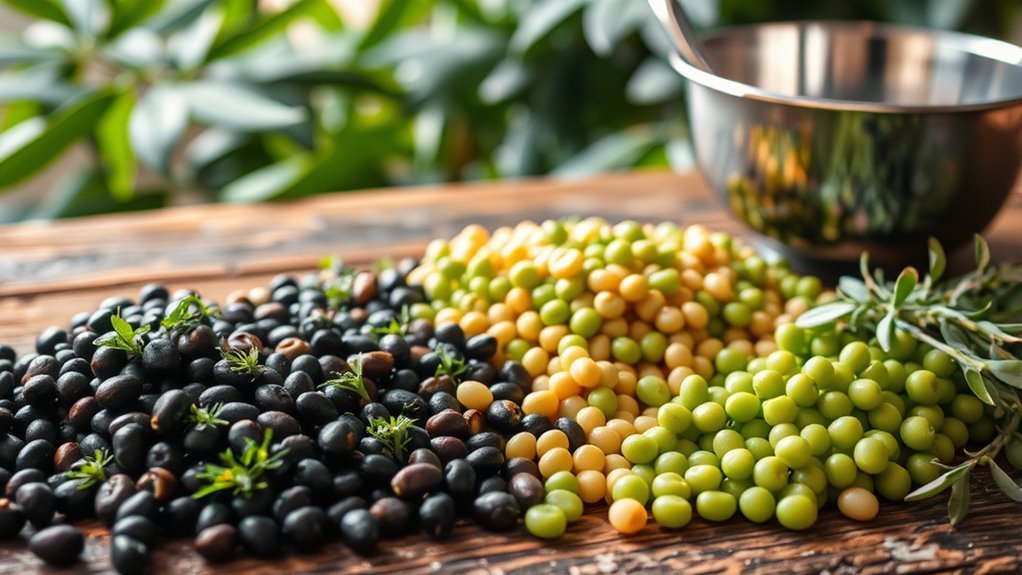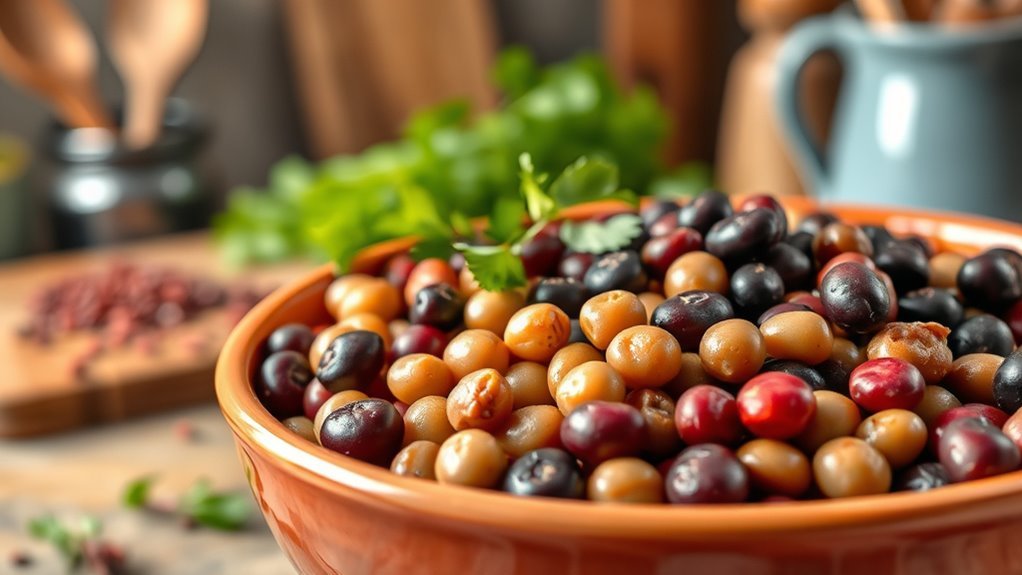Beans are typically high in carbohydrates, making them difficult to incorporate into a strict ketogenic diet. With options like black beans and kidney beans containing around 40g of carbs per cup, they aren’t ideal for maintaining ketosis. However, low-carb alternatives like black soybeans and edamame can fit into your meals in moderation. By choosing these options and pairing them with healthy fats, you can enjoy beans while staying within your carb limits. Discover more practical tips on how to make it work.
Understanding the Ketogenic Diet

When you commence on the ketogenic diet, it’s essential to understand its core principles to maximize its benefits. The ketogenic diet focuses on altering your body’s energy source from carbohydrates to fats, enabling a state known as ketosis. To achieve this, you’ll need to adhere to specific macronutrient ratios: typically, about 70-75% of your daily calories should come from fats, 20-25% from proteins, and only 5-10% from carbohydrates. This shift encourages your body to burn fat for fuel, promoting weight loss and improved energy levels. Understanding these ketogenic principles is fundamental for maintaining this dietary approach effectively. By following these guidelines, you can enjoy the freedom of enhanced health and vigor while steering your food choices.
Nutritional Profile of Beans

Beans are often praised for their nutritional benefits, but when considering their role in the ketogenic diet, it’s important to analyze their macronutrient composition closely. Various bean varieties provide essential nutrients, but they may not align with your keto goals. Here are three key points about their nutritional profile:
- Protein Sources: Beans are excellent plant-based protein sources, providing about 15 grams of protein per cup.
- Carbohydrate Content: While nutritious, beans can contain high carbohydrate levels, which may hinder ketosis.
- Fiber: Beans are rich in fiber, aiding digestion, but it also contributes to their carb count.
Understanding these aspects can help you decide if beans fit into your keto lifestyle while ensuring you maintain your dietary freedom.
Types of Beans and Their Carb Content

When you’re considering beans on a keto diet, it’s crucial to know which types are lower in carbs. Common beans can vary greatly in their carbohydrate content, so you’ll want to choose wisely. We’ll explore some low-carb options and share cooking tips to help you incorporate them into your meals effectively.
Common Beans Overview
Several common types of beans are often considered in the context of a keto diet, each varying considerably in their carbohydrate content. If you’re exploring bean varieties as protein sources, here are three you should know about:
- Black Beans: Approximately 41g of carbs per cup, making them high in carbs and less keto-friendly.
- Kidney Beans: Roughly 40g of carbs per cup, similar to black beans, and not ideal for strict keto.
- Pinto Beans: About 45g of carbs per cup, which also places them outside the low-carb range.
While beans are nutritious, their carb content can limit your options on a keto diet. Understanding these figures helps you make informed choices, ensuring you maintain your dietary goals.
Low-Carb Bean Options
If you’re looking for low-carb alternatives to traditional beans, there are several options that can fit into your keto lifestyle. Here are some popular low-carb bean substitutes worth considering:
| Bean Type | Net Carbs (per 1/2 cup) |
|---|---|
| Black Soybeans | 1g |
| Edamame | 3g |
| Green Beans | 4g |
These options provide the texture and satisfaction you might miss from regular beans while keeping your carb intake low. Incorporating these low-carb alternatives into your meals can help maintain your keto goals without sacrificing flavor. So, next time you’re craving beans, give these substitutes a try!
Cooking Methods and Tips
Exploring cooking methods for low-carb beans can enhance your keto meals while keeping carb counts in check. Using the right cooking techniques can transform beans into delicious, satisfying dishes. Here are three tips for maximizing flavor and minimizing carbs:
- Soaking and Sprouting: Soak beans overnight and sprout them to reduce antinutrients and improve digestibility. This can lower the effective carb count.
- Roasting: Roasting beans can intensify their flavor. Toss them with olive oil and spices before baking for a crunchy snack.
- Soups and Stews: Incorporate low-carb beans into hearty soups or stews. This method not only enhances flavors but also helps you control portion sizes.
With these strategies, you’ll enjoy the freedom of flavorful, keto-friendly meals!
Benefits of Beans in a Diet
When you incorporate beans into your diet, you’re adding a powerhouse of nutrients that can enhance your overall health. They’re rich in fiber, which can greatly improve your digestive health and help you feel fuller for longer. Understanding the nutritional value of beans will guide you in making informed choices that align with your dietary goals.
Nutritional Value Overview
Although beans are often seen as a staple in many diets, their nutritional value can be particularly beneficial even for those following a keto diet. Here are three key benefits of including bean varieties in your meals:
- High Protein Content: Beans serve as excellent protein sources, helping you maintain muscle mass while on a low-carb diet.
- Nutrient Density: They’re rich in essential vitamins and minerals, including iron, magnesium, and folate, crucial for overall health.
- Versatile Options: With various bean varieties available, you can easily incorporate them into your meals, adding unique flavors and textures.
Fiber and Digestive Health
Including beans in your diet can greatly enhance your fiber intake, which plays an essential role in promoting digestive health. Beans are one of the best fiber sources available, providing both soluble and insoluble fiber that aids in digestion. Soluble fiber helps regulate blood sugar levels and lowers cholesterol, while insoluble fiber adds bulk to your stool, preventing constipation. By incorporating beans into your meals, you’re not only enjoying their nutritional benefits but also experiencing significant digestive benefits. They support a healthy gut microbiome, which can improve overall gut health. So, if you’re looking to embrace a diet that fosters digestive wellness, consider adding beans—they can empower you to feel your best while enjoying delicious meals.
Incorporating Beans Into a Keto-Friendly Meal Plan
While many might think beans are off the table on a keto diet due to their carb content, careful incorporation can actually enhance your meal plan. You can enjoy beans by choosing lower-carb options and using them strategically. Here are some tips for incorporating beans into your keto recipes:
- Opt for black soybeans: They have fewer carbs and can be used in soups or salads.
- Substitute beans with lentils: When cooked properly, lentils can provide similar texture with lower carbs.
- Use beans in moderation: Add small portions to dishes to maintain flavor while keeping carbs low.
With these bean substitutions, you can enjoy diverse flavors while sticking to your keto-friendly meal plan.
Tips for Enjoying Beans on Keto
If you’re looking to enjoy beans on a keto diet, it’s essential to be mindful of your choices and portion sizes. Opt for lower-carb bean alternatives like black soybeans or green beans, which can fit more easily into your meal plan. Remember to keep portions small—aim for about half a cup to stay within your carb limits. Pair beans with healthy fats, like avocado or olive oil, to create satisfying keto snacks. You can also explore recipes that incorporate spices and herbs to enhance flavor without adding carbs. Finally, track your daily carb intake to make sure you’re not exceeding your limits while enjoying the versatility of beans on your keto journey.
Frequently Asked Questions about Beans on the Keto Diet
1. Can I eat beans on a keto diet?
While beans are a great source of protein and fiber, they are generally high in carbohydrates, which makes them less suitable for a strict ketogenic diet. Most beans, such as black beans and kidney beans, contain around 20-30 grams of carbs per cup, which can exceed the daily carb limit for those on keto. However, smaller amounts of certain low-carb beans, like green beans or black soybeans, can be incorporated in moderation.
2. Which types of beans are lowest in carbs?
If you’re looking for lower-carb options, black soybeans and green beans are among the best choices. Black soybeans contain about 2 grams of net carbs per half-cup serving, making them a keto-friendly option. Green beans also have a relatively low carb count, with about 4 grams of net carbs per half-cup. These can be enjoyed in moderation on a keto diet.
3. What are the nutritional benefits of beans?
Beans are packed with essential nutrients, including protein, fiber, vitamins, and minerals. They can help improve digestive health due to their high fiber content, support heart health, and provide a steady source of energy. However, on a keto diet, it’s essential to balance these benefits against their carbohydrate content, which can disrupt ketosis if consumed in excess.
4. How can I incorporate low-carb beans into my keto meal plan?
To incorporate low-carb beans like black soybeans or green beans into your keto meal plan, consider adding them to salads, stir-fries, or soups in limited portions. You can also use them as a side dish or mix them into casseroles. Just be sure to track your carbohydrate intake to ensure you stay within your daily limit.
5. Are there any alternatives to beans for protein on the keto diet?
Yes, there are several alternatives to beans for protein on the keto diet. Some great options include meat (beef, chicken, pork), fish, eggs, dairy products (cheese, yogurt), and plant-based sources like nuts and seeds. These alternatives provide high-quality protein without the high carbohydrate content found in most beans, making them more suitable for a ketogenic lifestyle.
References
- https://www.healthline.com/nutrition/keto-diet-foods#beans
- https://www.ncbi.nlm.nih.gov/pmc/articles/PMC6467198/
- https://www.verywellfit.com/are-beans-keto-friendly-5115153
- https://www.dietdoctor.com/low-carb/keto/food-list
- https://www.medicalnewstoday.com/articles/321897
- https://www.bbcgoodfood.com/howto/guide/what-eat-keto-diet
- https://www.ketodietapp.com/Blog/post/Are-Beans-Keto-Friendly


